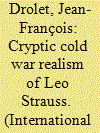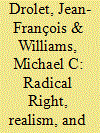| Srl | Item |
| 1 |
ID:
085897


|
|
|
|
|
| Publication |
2009.
|
| Summary/Abstract |
This paper seeks to shed light upon recent controversies concerning Leo Strauss' alleged influence on contemporary American and global politics. It exposes and analyses Strauss' trenchant critique of liberal modernity and then offers a critical discussion on the nature of his legacy and the reception of his ideas in the United States since the 1950s. It is argued that although there are very good reasons to be anxious about the political implications of his ideas, when understood in the cultural and intellectual context of Weimar Germany and post-war America, Strauss' philosophical enterprise is more ambiguous than it has been suggested by his most fervent detractors in recent feuds over America's 'war on terror'. To the extent that Strauss has anything to do with contemporary politics and international relations, the analysis presented here suggests that his influence has less to do with the Bush administration's war cabinet than with the long-drawn efforts of neo-conservative intellectuals to foment the political and socio-cultural conditions that have facilitated the 're-nationalisation' of America and its incremental departure from the socio-economic and geopolitical pacts of the post-war period since the 1970s.
|
|
|
|
|
|
|
|
|
|
|
|
|
|
|
|
| 2 |
ID:
179324


|
|
|
|
|
| Summary/Abstract |
The rise of the radical Right over the last decade has created a situation that demands engagement with the intellectual origins, achievements, and changing worldviews of radical conservative forces. Yet, conservative thought seems to have no distinct place in the theoretical field that has structured debates within the discipline of IR since 1945. This article seeks to explain some of the reasons for this absence. In the first part, we argue that there was in fact a clear strand of radical conservative thought in the early years of the field's development and recover some of these forgotten positions. In the second part, we argue that the near disappearance of those ideas can be traced in part to a process of ‘conceptual innovation’ through which postwar realist thinkers sought to craft a ‘conservative liberalism’ that defined the emerging field's theoretical alternatives in ways that excluded radical right-wing positions. Recovering this history challenges some of IR's most enduring narratives about its development, identity, and commitments – particularly the continuing tendency to find its origins in a defining battle between realism and liberalism. It also draws attention to overlooked resources to reflect upon the challenge of the radical Right in contemporary world politics.
|
|
|
|
|
|
|
|
|
|
|
|
|
|
|
|